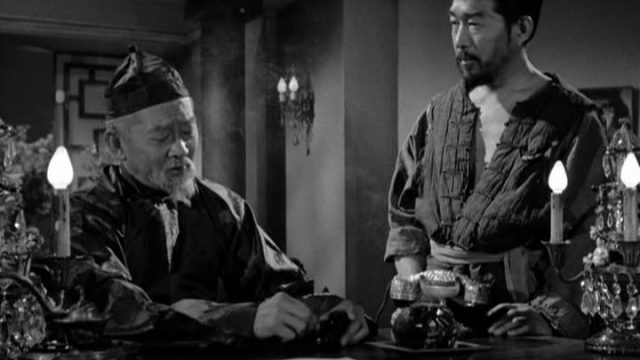It is sad but true that a lot of Chinese actors’ careers really took off starting in 1942. There was a need for actors to play Evil Japanese Soldiers, but the actual Japanese-American actors were in internment camps. This is awful for multiple reasons. However, it is true that Richard Loo went from mostly playing uncredited characters and Tong chiefs to playing a surprising number of majors in a single year. It’s also not all that surprising that even several of his early characters were villains; he was very good at having a sinister appearance.
It also tells you a fair amount about Hollywood in the ‘20s that Loo considered getting into the movies to be more steady work than working in business after the stock market crash. He’d graduated from UC Berkeley just a few years earlier; his Wikipedia entry and his IMDb bio are pretty much identical and merely say that he was involved in “business.” One assumes that’s in the financial industry in some way, but it’s awfully vague. Whatever it was, he started to be involved in local theatre before slowly making his way into the movies.
Let’s be real—even those Japanese characters were unlikely to rise above the level of stereotype. He has a few good roles; The Steel Helmet is considered to be one of Samuel Fuller’s best movies, and Loo is very good in it. And on his one Perry Mason appearance, he’s helping Chinese people having issues with their government. But by and large, the roles for an Asian-American man weren’t the greatest; at least he escaped Mako’s embarrassment and wasn’t in The Ugly Dachshund?
Interestingly, most of his roles were as Chinese characters, after the war. Including, to my Gen-X delight, a character on Wild Wild West named Wang Chung. Apparently, his Man With a Golden Gun character is supposed to be Thai, but “Hai Fat” is not even close to a Thai name. He played a lot of people named “Yang” or some variation on “Tsung.” And if there was the occasional “Kenji Yamashita” in there, well, he also played a character solely credited as “Leo.” It’s certainly one of those details that’s worth noting.
Apparently, he didn’t mind playing Japanese villains, inasmuch as he felt it was his patriotic duty. It was something he could do for his country—he was born in Hawaii, obviously not while it was a state but still. If Ronald Reagan and John Wayne were helping their country by doing propaganda films, one assumes that so too was Loo, when he played a Japanese officer who killed himself because he couldn’t break American POWs in The Purple Heart. Or even just playing Hirohito in a musical number featuring Dorothy Lamour, Veronica Lake, and Paulette Goddard in Star-Spangled Rhythm.
I do not have a career in business to fall back on; consider supporting my Patreon or Ko-fi!

